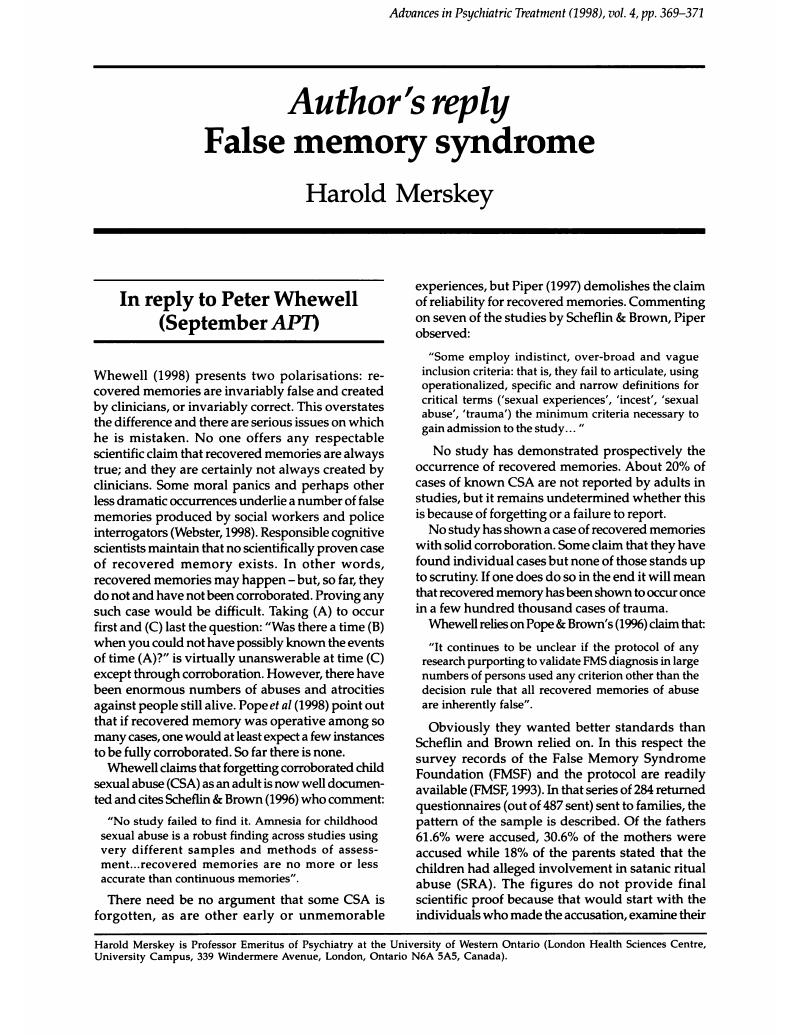No CrossRef data available.
Article contents
Author's reply False memory syndrome
Published online by Cambridge University Press: 02 January 2018
Abstract
An abstract is not available for this content so a preview has been provided. As you have access to this content, a full PDF is available via the ‘Save PDF’ action button.

Information
- Type
- Reply
- Information
- Copyright
- Copyright © The Royal College of Psychiatrists 1998
References
American Medical Association Council on Scientific Affairs (1994) Memories of Childhood Abuse. CSA Report 5. Chicago, IL: American Medical Association.Google Scholar
American Psychiatric Association (1993) Statement on Memories of Sexual Abuse. Washington, DC: APA.Google Scholar
Andrews, B., Morton, J., Bekerian, D. A.
et al (1995) The recovery of memories in clinical practice. Psychologist, May, 205–214.Google Scholar
Brandon, S., Boakes, J., Glaser, D.
et al (1998) Recovered memories of childhood sexual abuse. Implications for clinical practice. British Journal of Psychiatry, 172, 296–307.CrossRefGoogle ScholarPubMed
British Psychological Society (1995) Recovered Memories. The Report of the Working Party of the British Psychological Society. Leicester: British Psychological Society.Google Scholar
False Memory Syndrome Foundation (1993) False Memory Syndrome Foundation 1993 Family Survey Results. Philadelphia, PA: FMSF.Google Scholar
Lief, H. & Fetkewicz, J. (1995) Retractions of false memories: the evolution of pseudo-memories. Journal of Psychiatry and Law, 23, 411–435.Google Scholar
Pendergrast, M. (1997) Victims of Memory. Incest Accusations and Shattered Lives. London: Harper-Collins.Google Scholar
Piper, A. Jr (1997) What science says – and doesn't say – about repressed memories: a critique of Scheflin and Brown. Journal of Psychiatry and Law, 25, 615–639.Google Scholar
Poole, D. A., Lindsay, D. S., Memon, A.
et al (1995) Psychotherapy and the recovery of memories of childhood sexual abuse: US and British practitioners' opinions, practises and experiences. Journal of Consultation and Clinical Psychology, 63, 426–437.Google Scholar
Pope, H. G., Hudson, J. I., Bodkin, J. A.
et al (1998) Questionable validity of ‘dissociative amnesia’ in trauma victims. Evidence from prospective studies. British Journal of Psychiatry, 172, 210–215.Google Scholar
Pope, K. S. & Brown, L. (1996) Recovered Memories of Abuse: Assessment Therapy Forensics. Washington, DC: American Psychological Association.CrossRefGoogle Scholar
Scheflin, A. & Brown, D. (1996) Repressed memory or dissociative amnesia: What the science says. Journal of Psychiatry and Law, 24, 143–187.CrossRefGoogle Scholar
Webster, R. (1998) The Great Children's Homes Moral Panic. Oxford: Allwell Publications.Google Scholar
Weiskrantz, L. (1995) Comments on the report of the working party of the BPS on “Recovered Memories”. Therapist: Journal of European Therapy Studies Institute, 2, 5–8.Google Scholar


eLetters
No eLetters have been published for this article.